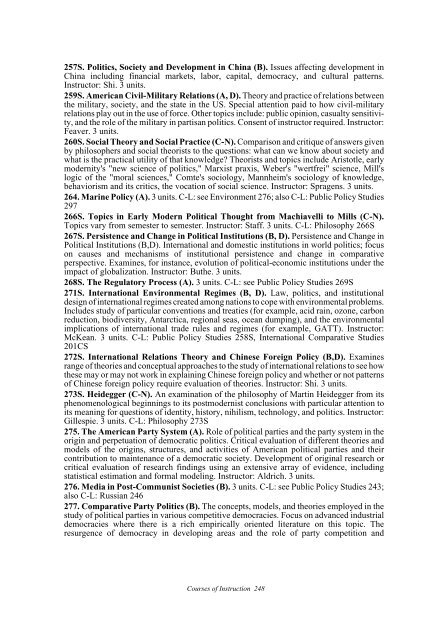Duke University 2008-2009 - Office of the Registrar - Duke University
Duke University 2008-2009 - Office of the Registrar - Duke University
Duke University 2008-2009 - Office of the Registrar - Duke University
Create successful ePaper yourself
Turn your PDF publications into a flip-book with our unique Google optimized e-Paper software.
257S. Politics, Society and Development in China (B). Issues affecting development in<br />
China including financial markets, labor, capital, democracy, and cultural patterns.<br />
Instructor: Shi. 3 units.<br />
259S. American Civil-Military Relations (A, D). Theory and practice <strong>of</strong> relations between<br />
<strong>the</strong> military, society, and <strong>the</strong> state in <strong>the</strong> US. Special attention paid to how civil-military<br />
relations play out in <strong>the</strong> use <strong>of</strong> force. O<strong>the</strong>r topics include: public opinion, casualty sensitivity,<br />
and <strong>the</strong> role <strong>of</strong> <strong>the</strong> military in partisan politics. Consent <strong>of</strong> instructor required. Instructor:<br />
Feaver. 3 units.<br />
260S. Social Theory and Social Practice (C-N). Comparison and critique <strong>of</strong> answers given<br />
by philosophers and social <strong>the</strong>orists to <strong>the</strong> questions: what can we know about society and<br />
what is <strong>the</strong> practical utility <strong>of</strong> that knowledge? Theorists and topics include Aristotle, early<br />
modernity's "new science <strong>of</strong> politics," Marxist praxis, Weber's "wertfrei" science, Mill's<br />
logic <strong>of</strong> <strong>the</strong> "moral sciences," Comte's sociology, Mannheim's sociology <strong>of</strong> knowledge,<br />
behaviorism and its critics, <strong>the</strong> vocation <strong>of</strong> social science. Instructor: Spragens. 3 units.<br />
264. Marine Policy (A). 3 units. C-L: see Environment 276; also C-L: Public Policy Studies<br />
297<br />
266S. Topics in Early Modern Political Thought from Machiavelli to Mills (C-N).<br />
Topics vary from semester to semester. Instructor: Staff. 3 units. C-L: Philosophy 266S<br />
267S. Persistence and Change in Political Institutions (B, D). Persistence and Change in<br />
Political Institutions (B,D). International and domestic institutions in world politics; focus<br />
on causes and mechanisms <strong>of</strong> institutional persistence and change in comparative<br />
perspective. Examines, for instance, evolution <strong>of</strong> political-economic institutions under <strong>the</strong><br />
impact <strong>of</strong> globalization. Instructor: Bu<strong>the</strong>. 3 units.<br />
268S. The Regulatory Process (A). 3 units. C-L: see Public Policy Studies 269S<br />
271S. International Environmental Regimes (B, D). Law, politics, and institutional<br />
design <strong>of</strong> international regimes created among nations to cope with environmental problems.<br />
Includes study <strong>of</strong> particular conventions and treaties (for example, acid rain, ozone, carbon<br />
reduction, biodiversity, Antarctica, regional seas, ocean dumping), and <strong>the</strong> environmental<br />
implications <strong>of</strong> international trade rules and regimes (for example, GATT). Instructor:<br />
McKean. 3 units. C-L: Public Policy Studies 258S, International Comparative Studies<br />
201CS<br />
272S. International Relations Theory and Chinese Foreign Policy (B,D). Examines<br />
range <strong>of</strong> <strong>the</strong>ories and conceptual approaches to <strong>the</strong> study <strong>of</strong> international relations to see how<br />
<strong>the</strong>se may or may not work in explaining Chinese foreign policy and whe<strong>the</strong>r or not patterns<br />
<strong>of</strong> Chinese foreign policy require evaluation <strong>of</strong> <strong>the</strong>ories. Instructor: Shi. 3 units.<br />
273S. Heidegger (C-N). An examination <strong>of</strong> <strong>the</strong> philosophy <strong>of</strong> Martin Heidegger from its<br />
phenomenological beginnings to its postmodernist conclusions with particular attention to<br />
its meaning for questions <strong>of</strong> identity, history, nihilism, technology, and politics. Instructor:<br />
Gillespie. 3 units. C-L: Philosophy 273S<br />
275. The American Party System (A). Role <strong>of</strong> political parties and <strong>the</strong> party system in <strong>the</strong><br />
origin and perpetuation <strong>of</strong> democratic politics. Critical evaluation <strong>of</strong> different <strong>the</strong>ories and<br />
models <strong>of</strong> <strong>the</strong> origins, structures, and activities <strong>of</strong> American political parties and <strong>the</strong>ir<br />
contribution to maintenance <strong>of</strong> a democratic society. Development <strong>of</strong> original research or<br />
critical evaluation <strong>of</strong> research findings using an extensive array <strong>of</strong> evidence, including<br />
statistical estimation and formal modeling. Instructor: Aldrich. 3 units.<br />
276. Media in Post-Communist Societies (B). 3 units. C-L: see Public Policy Studies 243;<br />
also C-L: Russian 246<br />
277. Comparative Party Politics (B). The concepts, models, and <strong>the</strong>ories employed in <strong>the</strong><br />
study <strong>of</strong> political parties in various competitive democracies. Focus on advanced industrial<br />
democracies where <strong>the</strong>re is a rich empirically oriented literature on this topic. The<br />
resurgence <strong>of</strong> democracy in developing areas and <strong>the</strong> role <strong>of</strong> party competition and<br />
Courses <strong>of</strong> Instruction 248









